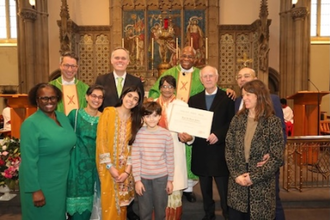Why won't the UK prosecute citizens suspected of committing genocide?

More than 900 British citizens joined Daesh, also known as Islamic State in the Levant. 425 returned to the UK, and yet only 32 have been prosecuted. The British taxpayer has funded the collection of evidence against Daesh through the UN body UNITAD. Yet, Parliament has been told that the police responsible for investigating international crimes "don't think" they have ever asked UNITAD for the evidence with which the UK authorities could prosecute those responsible for enslaving, torturing and raping women and girls for years.
In addition, the UK currently requires perpetrators to be resident in the UK, meaning that those responsible for war crimes can pass through Britain or remain temporarily, having medical treatment or looking at schools for their offspring, for instance. Proposing the report of the Joint Committee on Human Rights, Baroness Helena Kennedy urged the government to close the legal loopholes allowing perpetrators of genocide and crimes against humanity to escape justice.
Yet, in a House of Lords debate this week, the government rejected most of the recommendations in the report on accountability for the Yazidi religious minority in Iraq. The Yazidi were deliberately selected by Daesh for elimination, with many thousands killed and kidnapped, and 400,000 displaced. Moreover, 2,700 women and girls are thought to be enslaved in Turkey, Syria, Libya and Lebanon, traded on WhatsApp groups like chattels.
The government believes investigations of international crimes such as genocide should take place close to where they took place. However, Baroness Kennedy pointed out that circumstances in Iraq and Syria made this difficult, and hence no one has been prosecuted.
The Iraqis have passed death penalties on people for being members of Daesh or ISIL, Kennedy told the House of Lords, "but there has been no investigation into, for example, the enslavement, the constant raping and the selling on of women, who are dealt with as commodities. There was an occasion when 19 women were put into a cage and set on fire because they refused to convert."
Kennedy added that when she and Lord Alton (the chair of the Parliamentary Joint Committee) met the police and the unit dealing with international crimes such as genocide, they were told that Daesh members returning to the UK were not asked if they had been living with a wife or more than one wife in Iraq and Syria. "Often the additional women who were raped were referred to as being second and third temporary wives, and fourth, fifth and sixth wives," Kennedy continued.
There have been successful prosecutions of Daesh members for genocide in France, Sweden, Germany and the Netherlands using what is known as universal jurisdiction, a legal avenue also open to the UK, but not used by Britain. The Joint Committee urged the government to create a short-term court to try Britain's Daesh members for genocide, using testimony and evidence abundantly available.
Yazidi activists question why the UK signed treaties on universal jurisdiction and genocide if it is unwilling to prosecute. Speaking to a meeting before the debate, Dr Aldo Zammit-Borda, the co-author of the Yazidi Justice Committee Report, expressed concern that terrorism was being treated as a more serious crime than genocide, and that the "legal silencing" of charges of genocide would eventually lead to denial that the genocide against the Yazidi in 2014-17 had ever occurred.
Speaking after the debate, Pari Ibrahim of the Free Yezidi Foundation said that it was vital for women and girls who were enslaved, tortured and repeatedly raped by Daesh to have their suffering acknowledged. "These survivors cannot heal without justice. It is doubly traumatising to see their experiences minimised and swept under the carpet."
The UK recognised that the Yazidi had been subjected to genocide only after a German court made the determination. Lord Alton has repeatedly proposed legislation that would allow the government to make its own initial determinations of circumstances in which genocide is occurring and to refer cases to the appropriate international court. However, under both Conservative and Labour governments, ministers have resisted this move. Activists suggest British officials are wary of opening the UK to the possibility that it might be held accountable for historic war crimes.
Commenting on the government's response to report, Lord Alton told ICN, "In 2015 the then Government failed to listen to the pleas which I and others made in the House, warning of impending atrocities and genocide against minorities like the Yazidis and Christians. I hope that ministers will now act on our committee's recommendations to ensure both justice and a more effective way of responding to tell-tale signs of emerging genocides. Britain's present response makes a mockery of the 1948 Convention on the Crime of Genocide. As Lord Hope of Craighead has observed, it is no longer fit for purpose - and as the abysmal failure to bring to justice a single Briton involved in the genocide of the Yazidis demonstrates we must radically change the way we respond to such terrible atrocities."
Rebecca Tinsley is the chair of the Free Yezidi Foundation-USA board.


















